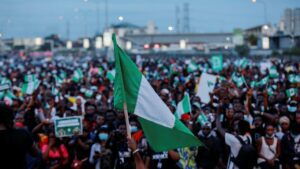
Edu’s suspension: Tinubu must not spare questionable appointees, heads of MDAs
Recent unveilings of financial misappropriation relating to diversion of public funds into private accounts, involving the Minister of Humanitarian Affairs and Poverty Alleviation, Dr. Betta Edu attracted wide concern. Order by President Bola Tinubu suspending the minister was a quick action swiftly taken to bring on another layer of insight to the discourse.
Corruption has become endemic in the Country’s public system, frustrating good governance. Edu, according to the report, had asked the Accountant General of the Federation, Mrs Oluwatoyin Sakirat Madein to send public funds to a private account that belonged to Oniyelu Bridget Mojisola, identified as a project manager by the minister.
The minister had approved that N585,198,500.00 should be disbursed into a personal account. The ministry approved funds for flight tickets and airport taxis for her team from Abuja to Kogi State, even though the latter has no airport.
Consequently, President Tinubu suspended Edu and ordered an investigation into the alleged fraudulent activities of the minister. Reactions had trailed the swift action of the President. The ruling All Progressives Congress (APC) had justified the president’s action, saying there are processes information undergoes before it gets to the president.
The National Publicity Secretary of the All progressives Congress, Felix Morka stated this in an interview with Arise had said, “We are talking about the President of the Federal Republic of Nigeria, you don’t expect that every act that happens in a ministry is something that is mirrored in the presidency or that there is a board where the president is seeing everything happening in every ministry.
“When there is a problem, that problem works its way up through the channels of information of vetting and filtering to present information to the president for his assessment and decision. I don’t think the timeline that you are talking about is less swift because people discussed it first. My point is that the president responded as swiftly as can be and appropriately on this matter.”
Morka had also said no one can regulate the actions of humans, adding that there is no mechanism available for a party to modulate the conducts of its members. He had added that the only thing that can be done is to set standards and consequences for those who take those actions.
“You are expecting superhumans to be members of the APC and therefore people who are high above reproach and will do no wrong. That is not the standard of any democracy or any political party because people populate the parties. The question is not whether people do wrong, there is no mechanism available for a party to modulate human conduct.
“You can set standards and parameters for imposing consequences for when those actions are taken. That is what this president has done. Whether people choose to do what they do is beyond the control of the president. The question is, has the president responded as expected in a democracy? Yes. He swiftly responded to the appearance that something wrong was done,” he said.
The question over how the silence of the president on the matter without a punitive directive would have further angered the public who are already pressed by the hardship of economic conditions readily comes to view. The Socio-Economic Rights and Accountability Project (SERAP) had earlier called on President Tinubu to direct the Attorney General of the Federation and Minister of Justice Mr Lateef Fagbemi (SAN) and appropriate anti-corruption agencies to promptly and thoroughly probe the alleged payment by the Minister of Humanitarian Affairs, Betta Edu of N585.2 million meant for disbursement to vulnerable people in Akwa Ibom, Cross River, Lagos, and Ogun states into a private account.”
SERAP had also urged him “to direct Mr Fagbemi and appropriate anti-corruption agencies to promptly and thoroughly investigate whether the N585.2 million has been paid into any private account, and to identify and publish the names of anyone who may have received the money.”
SERAP had said, “Anyone suspected to be involved in any improper payment or diversion of public funds should be brought to justice and any diverted public funds returned to the public treasury and paid directly to the rightful beneficiaries.”
In the letter dated 6 January 2024 and signed by SERAP deputy director Kolawole Oluwadare, the organisation had said: “Paying public funds into private accounts may create the perception or appearance of impropriety and give cover to any potential wrongdoing or diversion.”
According to SERAP, “Investigating these allegations and ensuring that the public funds meant to take care of the poor are transparently and accountably spent and recovering any diverted public funds are serious and legitimate public interests.”
The letter had read in part: “The public interests in safeguarding against the perception or appearance of impropriety or corruption also require your government to remove the opportunity for abuse inherent in the payment of public funds into private accounts.
“The Nigerian Constitution 1999 [as amended], the country’s financial regulations and international obligations impose a fundamental obligation on your government to ensure transparency and accountability in the spending of public funds meant for socially and economically vulnerable Nigerians.
“Your government has a legal responsibility to ensure full compliance with the Financial Regulations 2009, prohibiting the payment of public funds into private accounts, to reduce vulnerability to corruption or risks of the funds being diverted for personal ends or other unlawful purposes.
“Government officials hold positions of public trust. Public officials are expected to ensure compliance with Nigerian laws and international standards in the discharge of their public functions.
“The persistent lack of transparency and accountability in the spending of public funds meant to take care of the poor raises issues of public trust, makes the funds vulnerable to corruption or mismanagement, and undermines the integrity of poverty intervention programmes.
“Your government has a legal obligation to probe and prosecute allegations of abuse of office and corruption in the spending of public funds meant to improve the conditions of vulnerable Nigerians.
“SERAP is concerned that successive governments have failed to ensure transparency and accountability in the spending of public funds budgeted for social safety-nets and poverty alleviation programmes and projects.
“Any risks of corruption in the spending of public funds meant to take care of the poor would erode the effectiveness of the government’s oft-repeated commitment to address the impact of the removal of fuel subsidy on vulnerable Nigerians.
“We would be grateful if the recommended measures are taken within 7 days of the receipt and/or publication of this letter. If we have not heard from you by then, SERAP shall consider appropriate legal actions to compel your government to comply with our request in the public interest.
“Any failure to investigate these grave allegations, bring suspected perpetrators to justice and recover any diverted public funds would undermine the integrity of the government’s poverty intervention programmes.
“It would also create cynicism, and eventually citizens’ distrust about the ability of your government to prevent corruption or the appearance of corruption in the programmes.
“Nigerians have the right to be free from poverty. Any risks of diversion of public funds budgeted to lift vulnerable Nigerians out of poverty would pose both direct and indirect threats to human rights, and exacerbate extreme poverty in the country.
“It would also undermine your government’s legal obligations to effectively and progressively address and combat extreme poverty as a matter of human rights.
“SERAP also urges you to direct Betta Edu to publish details of spending of public funds drawn from the account of the National Social Investment Program (NSIPA), an agency under the Ministry of Humanitarian Affairs and Poverty Allegation, including the names of beneficiaries and details of the amounts received by them since 29 May 2023.
“SERAP urges you to instruct the Economic and Financial Crimes Commission (EFCC) and Independent Corrupt Practices and Other Related Offences Commission (ICPC) to jointly track and monitor the spending of any public funds drawn from the account(s) of the National Social Investment Program (NSIPA).
“According to our information, the Minister of Humanitarian Affairs, Betta Edu, in a memo dated 20 December 2023 reportedly requested the Accountant General of the Federation, Oluwatoyin Madein, to transfer public fund – N585.2 million – into a private account of an official in her ministry.
“According to the memo, the money was transferred from the National Social Investment Program office account and is meant for disbursement to vulnerable people in Akwa Ibom, Cross River, Lagos, and Ogun states, under the federal government poverty intervention project called Grants for Vulnerable Groups. N219.4 million is to be transferred to the vulnerable people in Akwa Ibom State, N73.8 million to Cross River State, N219.4 million to Lagos State, and N72.4 million to Ogun State.
“SERAP is seriously concerned that years of allegations of corruption and mismanagement in the spending of public funds meant to support and assist vulnerable Nigerians and entrenched impunity of perpetrators have undermined the ability of successive governments to support those most in need.
“Section 15(5) imposes the responsibility on your government to ‘abolish all corrupt practices and abuse of power’ in the country.
“Under Section 16(1) of the Constitution, your government has a responsibility to ‘secure the maximum welfare, freedom and happiness of every citizen on the basis of social justice and equality of status and opportunity.’ Section 16(2) further provides that, ‘the material resources of the nation are harnessed and distributed as best as possible to serve the common good.’
“Chapter 7, Section 713 of the Federal Government’s Financial Regulations 2009, provides: ‘Personal money shall in no circumstances be paid into a government bank account, nor shall any public money be paid into a private account.’
“Articles 5 and 9 of the UN Convention against Corruption also impose legal obligations on your government to ensure proper management of public affairs and public funds, and to promote sound and transparent administration of public affairs.”
While the allegation has been subjected to investigation and it is not yet officially proven, it is pertinent to note that it is an act of impunity and disgust for a Minister overseeing a ministry meant to alleviate poverty to be found indulging in misappropriation of funds, translating to further impoverishing the people. The act of corruption has eaten deep on the fabric of the nation and has brought her to the knees. It is high time the menace be tackled headlong.
President Tinubu’s swift action is commendable but it must not just stop at that. He must not spare the rod from any of his appointees or any heads of Ministries, Departments, and Agencies (MDAs). The president must keep an open eye to give a clear picture that his government is meant for work and to be marred with corruption.
Hence, the president must be strictly disposed not to condone any official, no matter who it may concern, nor to tolerate anyone who is found culpable or questionably indulging in any corrupt act of misappropriating public funds. This is pertinent to safeguard the system at a time when scarce resources and dwindling revenue has handicapped the government.


